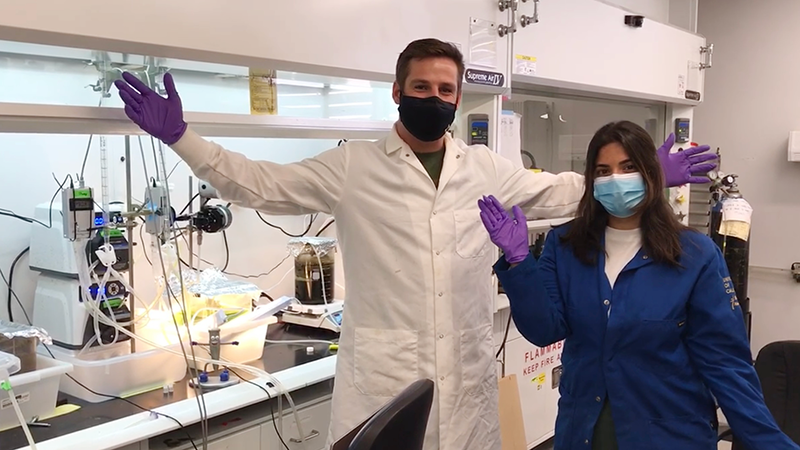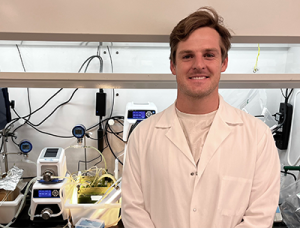Turning Wastewater Into a Resource: A Graduate Student’s Solution to Climate Change

Courtesy of Kevin Clack
Kevin Clack with lab partner, Kshitija Shah, in front of energy-positive wastewater recycling experiment
Growing up in Orange County, California, Clack was a cross-country and track runner in high school with no particular interest in environmental-related topics. He attributes his initial intrigue to his high school biology and physics teachers who made science interesting by emphasizing its impact on our daily lives.
“My teachers made environmental topics relatable, exciting and sometimes even scary,” Clack said.
Without a true sense of direction after high school, he planned to attend community college to continue running and to complete his general education before transferring to a four-year university. Instead, Clack says, “[he] was lucky to be accepted into San Diego State University (SDSU) after being waitlisted.”

Clack applied and was accepted to the program and soon found himself learning about sustainable sanitation and resource recovery solutions from local professors, engineers and students.
“It was such an eye-opening experience to learn about how other people lived and how other people addressed solutions related to clean water and sanitation,” Clack said.
In collaboration with local students and professors, this experience resulted in a published paper that focused on how duckweed, a small floating plant that grows in nutrient-rich aquatic environments, can be used to recover nitrogen and phosphorus from wastewater.
The experience also exposed Clack to the realm of academia, a field he hadn’t previously considered for his career. However, Clack first chose to pursue a career in industry in the industrial wastewater sector in Los Angeles, where he saw many missed opportunities for reduced water consumption and resource recovery. This observation later inspired Clack to pursue graduate studies at UCLA in environmental engineering.
“I noticed a lot of opportunities that were missed for resource recovery,” Clack said. “Not just recovering the water, but also things like biofuels, nutrients and fertilizers.”
Now a first year Ph.D. student, Clack is advised by civil and environmental engineering professors Eric Hoek and Shaily Mahendra. Hoek is also the faculty director of the UCLA Sustainable LA Grand Challenge, a campuswide initiative to transform Los Angeles into a sustainable megacity by 2050.
Clack is conducting research on reclaiming potable water from wastewater while also recovering pipeline-grade methane and other biofuels that can make the reclamation process carbon negative, energy positive, and economically favorable. This research aims to reduce the carbon emissions and economic burden of water reclamation.
“It was such an eye-opening experience to learn about how other people lived and how other people addressed solutions related to clean water and sanitation,” Kevin Clack said.
“As our upstream water sources become more strained due to population growth and climate change, we have to do some pretty extraordinary things to make life in Los Angeles work, and one of those is adopting recycled wastewater into our diversified water resource portfolio,” Clack said.
The approach will soon be pilot tested and if it is validated, Clack said he hopes the system will be adapted into municipal wastewater reclamation systems in the future, including the water recycling plant to be built on UCLA’s campus by 2025.
For his effort, Clack has been invited to speak at an upcoming event hosted by the Los Angeles World Affairs Council and Town Hall on Earth Day (April 22). Clack will join two other panelists at the “Climate Change: Los Angeles Youth in Action” event, discussing ways to address climate change with high school students from the Los Angeles and Pasadena unified school districts in the hope that they are inspired to be changemakers in their communities.
“Today’s youth will become the next generation of leaders and pioneers of climate-related solutions and I hope they come to appreciate that long-term solutions will require collaboration between all fields in our society including science, engineering, business, policy, law, medicine and agriculture, just to name a few,” Clack said. “It is important for high school students to pursue opportunities and connections where they can be inspired and mentored and engage in learning about how their career can impact the future of society.”
As he works to engineer solutions for water resources on the societal level, Clack has engineered some water-saving technology at home as well.
“One thing that I’ve been working on personally — and that is actually kind of fun — is you can capture [shower] water and use it to flush your toilet,” Clack said.
Using a thermostatic valve, Clack designed a system that diverts cold shower water to the toilet reservoir as it’s heating, and once the shower hits the proper temperature, the valve shuts the water off, so Clack has a hot shower and a full toilet reservoir ready to flush without wasting water.
Clack also seeks to encourage others to make individual changes that will positively impact the climate — from choosing food with lower carbon footprint to dialing down on water and energy consumption.
“We don’t need to be engineers or climate scientists to reduce our impact on the climate; we can all take opportunities to learn about our societal and individual impacts on the climate and build intuition to examine how our personal choices will impact our environment,” Clack said.
Natalie Weber contributed to this story.
